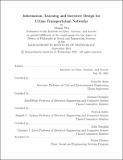| dc.contributor.advisor | Amin, Saurabh | |
| dc.contributor.author | Wu, Manxi | |
| dc.date.accessioned | 2022-02-07T15:20:02Z | |
| dc.date.available | 2022-02-07T15:20:02Z | |
| dc.date.issued | 2021-09 | |
| dc.date.submitted | 2021-10-20T22:21:48.151Z | |
| dc.identifier.uri | https://hdl.handle.net/1721.1/140032 | |
| dc.description.abstract | Today's data-rich platforms are reshaping the operations of urban transportation networks by providing information and services to a large number of travelers. How can we model the travelers' strategic decisions in response to services provided by these platforms and develop tools to improve the aggregate outcomes in a socially desirable manner? In this thesis, we tackle this question from three aspects: 1) Game-theoretic analysis of the impact of information platforms (navigation apps) on the strategic behavior and learning processes of travelers in uncertain networks; 2) Market mechanism design for efficient carpooling and toll pricing in the presence of autonomous driving technology; 3) Security analysis and resource allocation for robustness under random or adversarial disruptions.
Firstly, we present game-theoretic analysis to evaluate the impact of multiple heterogeneous information platforms on travelers’ selfish routing decisions, and the resulting network congestion. We compare the value of information provided by multiple platforms to their users, and capture the key trade-off between the gain from information about uncertain network state and the congestion externality resulting from other users. We also design an optimal information structure that induces socially preferred traffic flows. Next, we extend the static model to a dynamic setting that addresses the behavior of users who learn and strategically act in an uncertain environment, while adapting their decisions to the up-to-date information received from platforms. The resulting stochastic learning dynamics requires analyzing strategic and adaptive (hence, endogenous and non i.i.d.) data. We present new results for convergence and stability of such learning dynamics and develop conditions for convergence to complete information equilibrium.
Secondly, we design a market mechanism that enables efficient carpooling and optimal toll pricing in an autonomous transportation market. In this market, the transportation authority sets toll prices on edges, and riders organize carpooled trips using driverless cars and split payments. Riders have heterogeneous preferences, with the value of each trip depending on the travel time of chosen route and rider-specific parameters that capture their individual value of time and carpool disutilities. We identify sufficient conditions on the network topology and travelers' preferences under which a market equilibrium exists, and carpooling trips can be organized in a socially optimal manner. We also present an algorithm that computes a set of equilibrium trips, toll prices and payments that maximize rider utilities.
Finally, we analyze stylized game-theoretic models of attacker-defender interactions for the purpose of evaluating security risks in transportation networks. Our equilibrium analysis suggests an optimal resource allocation strategy to defend multiple infrastructure facilities against an adversarial attacker. To evaluate robustness against random disturbances, we also develop a class of machine learning models that predict the change of travelers' usage demand in congestion-prone multi-modal networks. These results have the potential to help mitigate the impact of transportation network disruptions and limit security risks. | |
| dc.publisher | Massachusetts Institute of Technology | |
| dc.rights | In Copyright - Educational Use Permitted | |
| dc.rights | Copyright MIT | |
| dc.rights.uri | http://rightsstatements.org/page/InC-EDU/1.0/ | |
| dc.title | Information, Learning and Incentive Design for Urban Transportation Networks | |
| dc.type | Thesis | |
| dc.description.degree | Ph.D. | |
| dc.contributor.department | Massachusetts Institute of Technology. Institute for Data, Systems, and Society | |
| dc.identifier.orcid | 0000-0001-5334-4163 | |
| mit.thesis.degree | Doctoral | |
| thesis.degree.name | Doctor of Philosophy | |
